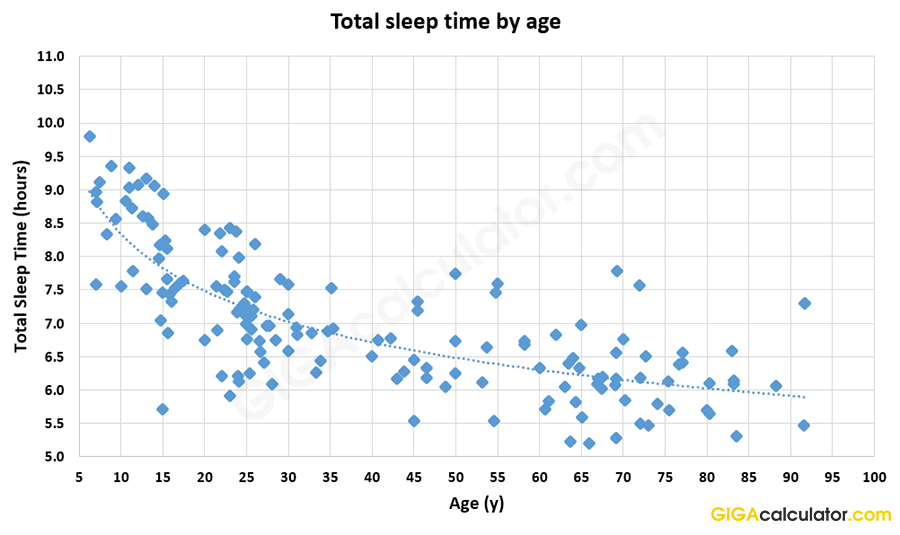The question “How much sleep do I need” as an adult is what comes to mind if you feel groggy when you wake up, feel tired throughout the day, or are generally irritable and in low mood. The question of how many sleep hours are needed is even more pertinent to school-age children and teenagers who are often found to be sleep deprived due to demanding school schedules, the invasion of devices into their lives, and ever later bedtimes. These questions are ever more pressing since, as we previously wrote, one-third of all Americans don’t get enough sleep every night according to the Centers for Disease Control (CDC).
This article will cover both the scientifically-based guidelines and statistics about typical sleep durations in children, adolescents, and adults of all ages.

Recommended hours of sleep by age
The amount of sleep needed varies greatly by age, which is why there are no universally recommended hours of sleep. The most up-to-date consensus recommendation on how much sleep is needed comes from the National Sleep Foundation in a report called “National Sleep Foundation’s updated sleep duration recommendations: final report” [1]. It outlines the recommended, appropriate, and not recommended hours of sleep for all ages.
The table below is based on the report’s findings and recommendations and shows how long a person should sleep based on their age, assuming there are no health conditions that might necessitate otherwise. The recommended daily sleep hours are in line with other consensus statements [2] and can be interpreted as sleep requirements by age.
| Age group (range) | Recommended sleep time* | Appropriate sleep time* |
|---|---|---|
| Newborn (0-3 months) | 14-17 hours (including naps) | 11-19 hours (including naps) |
| Infant (4-12 months) | 12-15 hours (including naps) | 10-18 hours (including naps) |
| Toddler (1-2 years) | 11-14 hours (including naps) | 11-14 hours (including naps) |
| Preschool (3-5 years) | 10-13 hours (including a nap) | 8-14 hours (including a nap) |
| School-age (6-13 years) | 9-11 hours | 7-12 hours |
| Teen (14-17 years) | 8-10 hours | 7-11 hours |
| Young Adult (18-25) | 7-9 hours | 6-11 hours |
| Adult (26-64) | 7-9 hours | 6-10 hours |
| Older Adult (65 and above) | 7-8 hours | 6-9 hours |
* the sleep times are on a daily basis, and include naps where indicated
How many hours of sleep do adults need
In general, seven to nine hours of sleep are recommended for most healthy adults over the age of eighteen. Appropriate hours of sleep for most adults are between six and ten, with younger adults having a slightly greater leeway at eleven hours max, whereas older adults would sleep for no more than nine hours under normal conditions.
How much sleep do teenagers need
The recommended hours of sleep for teenagers are between eight and ten, with anywhere between seven and eleven hours of sleep still being considered appropriate sleep time.
Recommended hours of sleep for children
Children under the age of fourteen exhibit a greater variance in their sleep habits and the recommendations vary significantly even within just a year or two of age. Consult the table for the sleep time recommendations that apply.
Sleep time calculator
Our sleep calculator uses these guidelines and calculates how many hours of sleep are needed for a specified age group. It can suggest an appropriate bedtime based on a desired wake-up time, help you set your wake up alarm based on your bedtime while aligning sleep length with full sleep cycles so one wakes up refreshed instead of groggy. As an added functionality it outputs your REM sleep hours.
Sleep time by age
Average hours of sleep by age in the graph below is based on a reconstruction of the comprehensive meta-analytical data in Ohayon M.M. et al. 2004 [3]. The sample size is 2009 people combined across over 50 separate studies. Total sleep time (TST) in most of them was obtained by polysomnography, the gold standard in sleep measurements.

Each rhombus is the average sleep time of a separate study subgroup, in hours. Keep in mind that individual sleep hours are more varied than the averages of these populations, even if some studies included just two dozen participants.
In the original paper only a linear fit was presented, according to which age explained close to 50% of the variance in sleep hours. However, there was no informed decision to use a linear fit, so we present a power curve here which results in the best regression fit with R2 = 0.60 meaning that if the model is adequate, age explains 60% percent of the variance in total sleep time.
While the numbers above are not equivalent to recommendations on how much sleep is needed by age, they should serve as another guideline as to how many sleep hours are typical for a person of a given age.
Benefits of adhering to sleep hours recommendations
As the report by the National Sleep Foundation notes [1]: “Sleep, like diet and exercise, strongly influences many aspects of health including physical, cognitive, and emotional health. Although most individuals’ sleep duration falls within the “recommended” range, individuals and their physicians should carefully consider cognitive, physical, and emotional health when sleep durations do not”. Getting as much sleep as you need, all else being equal, can therefore be linked to a number of positive health and lifestyle outcomes.
That said, all of the above should not be considered a substitute for a proper consultation with a physician. Be sure to consult a medical doctor if you have any underlying medical conditions that may be linked to sleep disorders, or that may be affected positively or negatively by changes in your sleep schedule.
References
[1] Hirshkowitz M., Whiton K., et al. (2015) “National Sleep Foundation’s updated sleep duration recommendations: final report”, Journal of the National Sleep Foundation, Vol.1(4):233-243; doi: 10.1016/j.sleh.2015.10.004
[2] Paruthi S., Brooks L.J., et al. (2016) “Recommended Amount of Sleep for Pediatric Populations: A Consensus Statement of the American Academy of Sleep Medicine”, Journal of Clinical Sleep Medicine”, Vol.12(6):785–786
[3] Ohayon M.M., Carskadon M.A., et al. (2004) “Meta-analysis of quantitative sleep parameters from childhood to old age in healthy individuals: developing normative sleep values across the human lifespan”, Sleep, Vol.27(7):1255-73

An applied statistician, data analyst, and optimizer by calling, Georgi has expertise in web analytics, statistics, design of experiments, and business risk management. He covers a variety of topics where mathematical models and statistics are useful. Georgi is also the author of “Statistical Methods in Online A/B Testing”.